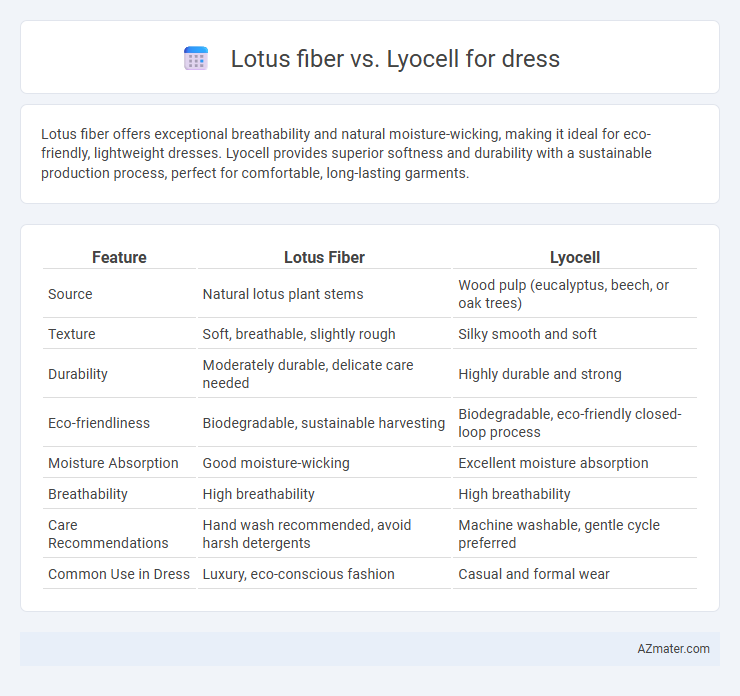Lotus fiber offers exceptional breathability and natural moisture-wicking, making it ideal for eco-friendly, lightweight dresses. Lyocell provides superior softness and durability with a sustainable production process, perfect for comfortable, long-lasting garments.
Table of Comparison
| Feature | Lotus Fiber | Lyocell |
|---|---|---|
| Source | Natural lotus plant stems | Wood pulp (eucalyptus, beech, or oak trees) |
| Texture | Soft, breathable, slightly rough | Silky smooth and soft |
| Durability | Moderately durable, delicate care needed | Highly durable and strong |
| Eco-friendliness | Biodegradable, sustainable harvesting | Biodegradable, eco-friendly closed-loop process |
| Moisture Absorption | Good moisture-wicking | Excellent moisture absorption |
| Breathability | High breathability | High breathability |
| Care Recommendations | Hand wash recommended, avoid harsh detergents | Machine washable, gentle cycle preferred |
| Common Use in Dress | Luxury, eco-conscious fashion | Casual and formal wear |
Overview: Lotus Fiber vs Lyocell
Lotus fiber, derived from lotus plant stems, offers exceptional breathability, natural hypoallergenic properties, and a unique textured appearance, making it an eco-friendly choice for sustainable dress fabrics. Lyocell, produced from wood pulp through an environmentally responsible solvent-spinning process, is known for its softness, moisture-wicking abilities, and durability, ideal for comfortable and versatile dress materials. Comparing both, lotus fiber emphasizes natural origin and texture, while lyocell excels in consistent smoothness and fabric strength for everyday wear.
Origin and Production Process
Lotus fiber is derived from the stem of the lotus plant, involving a labor-intensive, eco-friendly process that manually extracts and dries the fibers, resulting in a rare and sustainable textile. Lyocell, produced from sustainably sourced wood pulp primarily from eucalyptus trees, undergoes a closed-loop chemical process using non-toxic solvents, making it an environmentally responsible fiber with efficient production. Both fibers emphasize sustainability, but lotus fiber's handmade extraction contrasts with lyocell's industrial manufacturing, influencing texture and availability for dress materials.
Environmental Impact and Sustainability
Lotus fiber is highly sustainable due to its natural extraction from lotus stems without chemical processing, resulting in minimal environmental impact and biodegradability. Lyocell, produced from sustainably sourced wood pulp via a closed-loop process, offers excellent eco-friendliness by recycling solvents and reducing water consumption. Both fibers provide biodegradable, low-impact alternatives for dressmaking, with lotus fiber emphasizing natural harvest practices and lyocell focusing on industrial-scale environmental efficiency.
Physical Properties and Appearance
Lotus fiber offers a unique natural texture with high strength, breathability, and a distinct matte finish, making it ideal for eco-friendly, lightweight dresses. Lyocell exhibits a smooth, silky appearance with excellent drape, moisture-wicking properties, and high tensile strength, enhancing comfort and durability in dress fabrics. Both fibers provide sustainable options, but lotus fiber stands out for its rustic, artisanal look while lyocell excels in softness and sheen.
Comfort and Breathability
Lotus fiber offers exceptional breathability and moisture-wicking properties, making it an ideal choice for dresses in hot and humid climates, providing natural cooling and comfort throughout the day. Lyocell, derived from sustainably sourced wood pulp, is renowned for its softness, smooth texture, and excellent moisture absorption, enhancing comfort and reducing skin irritation. Both fibers excel in breathability, but lotus fiber's unique cellular structure gives it superior ventilation, while lyocell provides a silky feel with good temperature regulation.
Durability and Care Requirements
Lotus fiber offers exceptional durability due to its natural strength and resistance to wear, making it ideal for long-lasting dresses. Lyocell, while soft and breathable, tends to be less robust and may require more delicate care to maintain its integrity. Both fabrics benefit from gentle washing, but lotus fiber's resilience allows for easier maintenance and extended garment lifespan.
Fabric Performance for Dresses
Lotus fiber offers excellent breathability and natural moisture-wicking properties, making it ideal for lightweight, comfortable dresses in hot climates. Lyocell excels in durability, wrinkle resistance, and softness, providing a smooth drape and enhanced fabric longevity for everyday wear dresses. Both fibers are sustainable, but Lyocell's eco-friendly closed-loop production process ensures reduced environmental impact without compromising fabric performance.
Price and Market Availability
Lotus fiber is a rare, eco-friendly textile derived from lotus stems, resulting in limited market availability and a higher price point compared to Lyocell. Lyocell, made from sustainably sourced wood pulp, benefits from large-scale production, offering affordability and widespread availability in the fashion industry. For dresses, Lyocell remains the more accessible option, while Lotus fiber caters to niche markets seeking exclusive, luxury fabrics.
Eco-Friendliness and Certifications
Lotus fiber is a highly sustainable textile derived from the lotus plant, known for its low water consumption and biodegradable properties, making it an eco-friendly choice for dress materials. Lyocell, produced from sustainably sourced wood pulp through a closed-loop process, carries certifications such as OEKO-TEX and FSC, ensuring minimal environmental impact and chemical use. Both fibers support sustainable fashion, with Lotus fiber emphasizing natural biodegradability and Lyocell highlighting responsible forestry and chemical management standards.
Choosing the Right Fiber for Your Dress
Lotus fiber offers exceptional breathability and natural anti-bacterial properties, making it ideal for lightweight, eco-friendly dresses with a unique texture. Lyocell provides superior softness, durability, and moisture-wicking abilities, perfect for comfortable, wrinkle-resistant dresses suitable for everyday wear. Choosing the right fiber depends on desired dress characteristics such as texture, sustainability, and comfort, with lotus fiber favoring natural elegance and lyocell excelling in performance and versatility.

Infographic: Lotus fiber vs Lyocell for Dress
 azmater.com
azmater.com